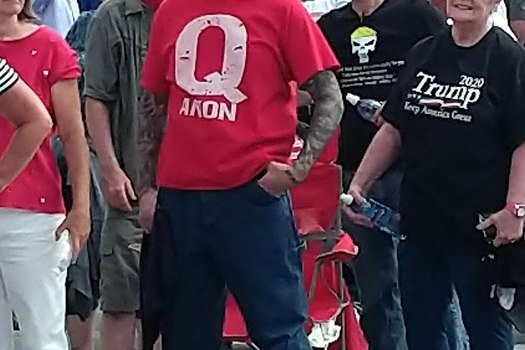Experts Warn of Candidates Pushing Conspiracy Theories in Arizona

Experts say groups such as QAnon and others who traffic in false conspiracy theories are becoming increasingly involved in American politics. (Wikimedia Commons)
October 5, 2020
TEMPE, Ariz. — As Arizonans head to the polls, experts say that to make an informed choice, they should study and understand each candidate’s position on the issues.
But they also warn – this being 2020 – voters also should be aware some candidates base their positions, at least in part, on unproven conspiracy theories spread over social media.
Bradley Adame, associate professor for the Center for Strategic Communication at Arizona State University, teaches social influence and messaging science and said fringe groups are using social media to insert their bizarre and sometimes vile narratives into the political discourse.
“One of the great benefits of social media is that you don’t have gatekeepers,” Adame explained. “So in traditional media, you have an editor or somebody who decides what is going to make it into the public discourse. Somebody said ‘yes’ and ‘no.’ With social media, you don’t really have that. So anybody can post anything.”
Adame said some politicians have aligned themselves with, if not outright embraced, groups such as QAnon or the Patriot militia movement.
Experts say their tales of the “deep state” or child-trafficking rings have gained an alarming number of believers. The FBI has designated such groups as domestic terror threats.
Adame said social media’s failure to control such content is a major part of the problem.
“If I can select certain voices and unselect other voices, I then get to pick out the people whose message I like, whose message I agree with,” Adame noted. “And all of a sudden it becomes this echo chamber where I’m only hearing the voices that I already agree with.”
He said such false conspiracies play into the hands of Russian or Chinese agents, who amplify the messages on social media to pit groups of Americans against each other.
He added people need to dig deeper when a story doesn’t make sense.
“People are not verifying sources, they’re not reading any deeper, they’re just sort of reading headlines,” Adame cautioned. “We see a lot of that, where people aren’t really critical consumers of information. That can be really dangerous.”
While sites such as Facebook and Twitter have taken some steps to counter conspiracy-theory postings, Adame believes they need to do more. Voters also can go on websites such as Snopes.com or FactCheck.org to check out suspicious information.
Mark Richardson, Public News Service – AZ
*** This article has been archived for your research. The original version from Public News Service can be found here ***


